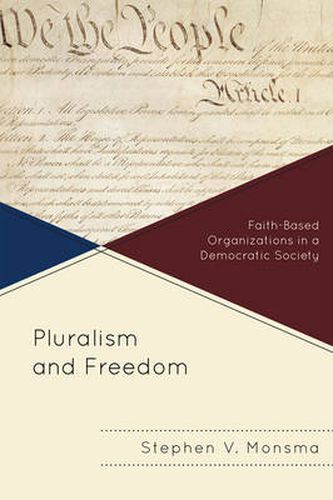Readings Newsletter
Become a Readings Member to make your shopping experience even easier.
Sign in or sign up for free!
You’re not far away from qualifying for FREE standard shipping within Australia
You’ve qualified for FREE standard shipping within Australia
The cart is loading…






Faith-based organizations play a major role in providing a host of health, educational, and social services to the public. Nearly all these efforts, however, have been accompanied by intense debate and numerous legal challenges. The right of faith-based organizations to hire based on religion, the presence of religious symbols and icons in rooms where government-subsidized services are provided, and the enforcement of gay civil rights to which some faith-based organizations object all continue to be subjects of intense debate and numerous court cases. In Pluralism and Freedom, Stephen V. Monsma explores the question of how much autonomy should faith-based organizations retain when they enter the public realm? He contends that pluralism and freedom demand their religious freedom be respected, but that freedom of all religious traditions and of the general public and secular groups be equally respected, ideals that neither the left nor the right live up to. In response, Monsma argues that democratic pluralism requires a genuine, authentic-but also a limited-autonomy for faith-based organizations providing public services, and offers practical, concrete public policy applications of this framework in practice.
$9.00 standard shipping within Australia
FREE standard shipping within Australia for orders over $100.00
Express & International shipping calculated at checkout
Faith-based organizations play a major role in providing a host of health, educational, and social services to the public. Nearly all these efforts, however, have been accompanied by intense debate and numerous legal challenges. The right of faith-based organizations to hire based on religion, the presence of religious symbols and icons in rooms where government-subsidized services are provided, and the enforcement of gay civil rights to which some faith-based organizations object all continue to be subjects of intense debate and numerous court cases. In Pluralism and Freedom, Stephen V. Monsma explores the question of how much autonomy should faith-based organizations retain when they enter the public realm? He contends that pluralism and freedom demand their religious freedom be respected, but that freedom of all religious traditions and of the general public and secular groups be equally respected, ideals that neither the left nor the right live up to. In response, Monsma argues that democratic pluralism requires a genuine, authentic-but also a limited-autonomy for faith-based organizations providing public services, and offers practical, concrete public policy applications of this framework in practice.